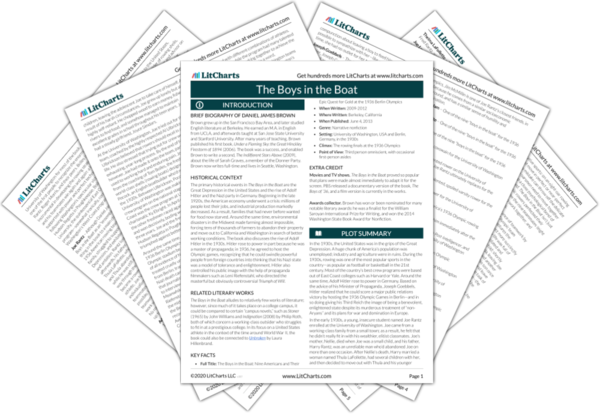Al Ulbrickson Quotes in The Boys in the Boat
The next year, 1924, Washington returned, with a young Al Ulbrickson rowing at stroke, and won the varsity race again, decisively this time. In 1926 they did it yet again, this time with Ulbrickson rowing the final quarter of a mile with a torn muscle in one arm. In 1928, Ky Ebright's California Bears won their first Poughkeepsie title en route to winning the Olympics that year and again in 1932. By 1934 the western schools were finally beginning to be taken seriously.

Unlock explanations and citation info for this and every other The Boys in the Boat quote.
Plus so much more...
Get LitCharts A+Back in February [Al Ulbrickson] had commented […] that "there are more good individual men on this year's squad than on any I have coached." The fundamental problem lay in the fact that he had felt compelled to throw that word "individual" into the sentence. There were too many days when they rowed not as crews but as boatfuls of individuals. The more he scolded them for personal technical issues, even as he preached teamsmanship, the more the boys seemed to sink into their own separate and sometimes defiant little worlds.
For Ulbrickson, there was one overriding, and dark, fact to be confronted: he had failed again to make good on his public promises. It was very much an open question whether he was going to get another chance.
Ulbrickson knew full well that money more or less grew on the trees at Yale, and that funds had been vastly easier to come by in 1928, before the Depression, than in 1936.

Al Ulbrickson Quotes in The Boys in the Boat
The next year, 1924, Washington returned, with a young Al Ulbrickson rowing at stroke, and won the varsity race again, decisively this time. In 1926 they did it yet again, this time with Ulbrickson rowing the final quarter of a mile with a torn muscle in one arm. In 1928, Ky Ebright's California Bears won their first Poughkeepsie title en route to winning the Olympics that year and again in 1932. By 1934 the western schools were finally beginning to be taken seriously.

Unlock explanations and citation info for this and every other The Boys in the Boat quote.
Plus so much more...
Get LitCharts A+Back in February [Al Ulbrickson] had commented […] that "there are more good individual men on this year's squad than on any I have coached." The fundamental problem lay in the fact that he had felt compelled to throw that word "individual" into the sentence. There were too many days when they rowed not as crews but as boatfuls of individuals. The more he scolded them for personal technical issues, even as he preached teamsmanship, the more the boys seemed to sink into their own separate and sometimes defiant little worlds.
For Ulbrickson, there was one overriding, and dark, fact to be confronted: he had failed again to make good on his public promises. It was very much an open question whether he was going to get another chance.
Ulbrickson knew full well that money more or less grew on the trees at Yale, and that funds had been vastly easier to come by in 1928, before the Depression, than in 1936.











